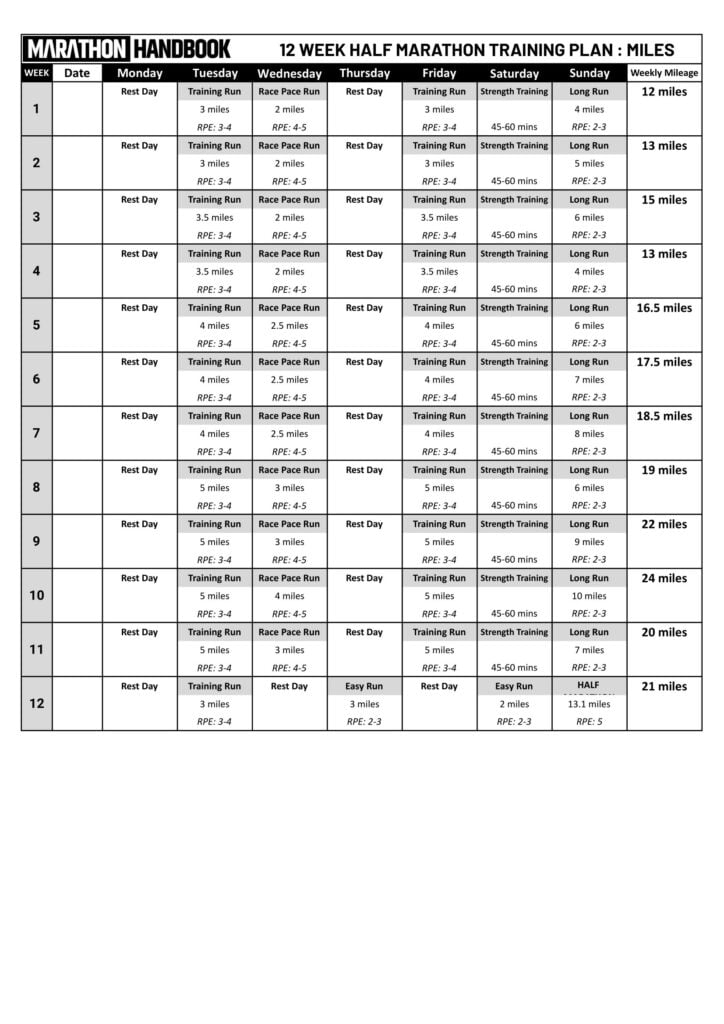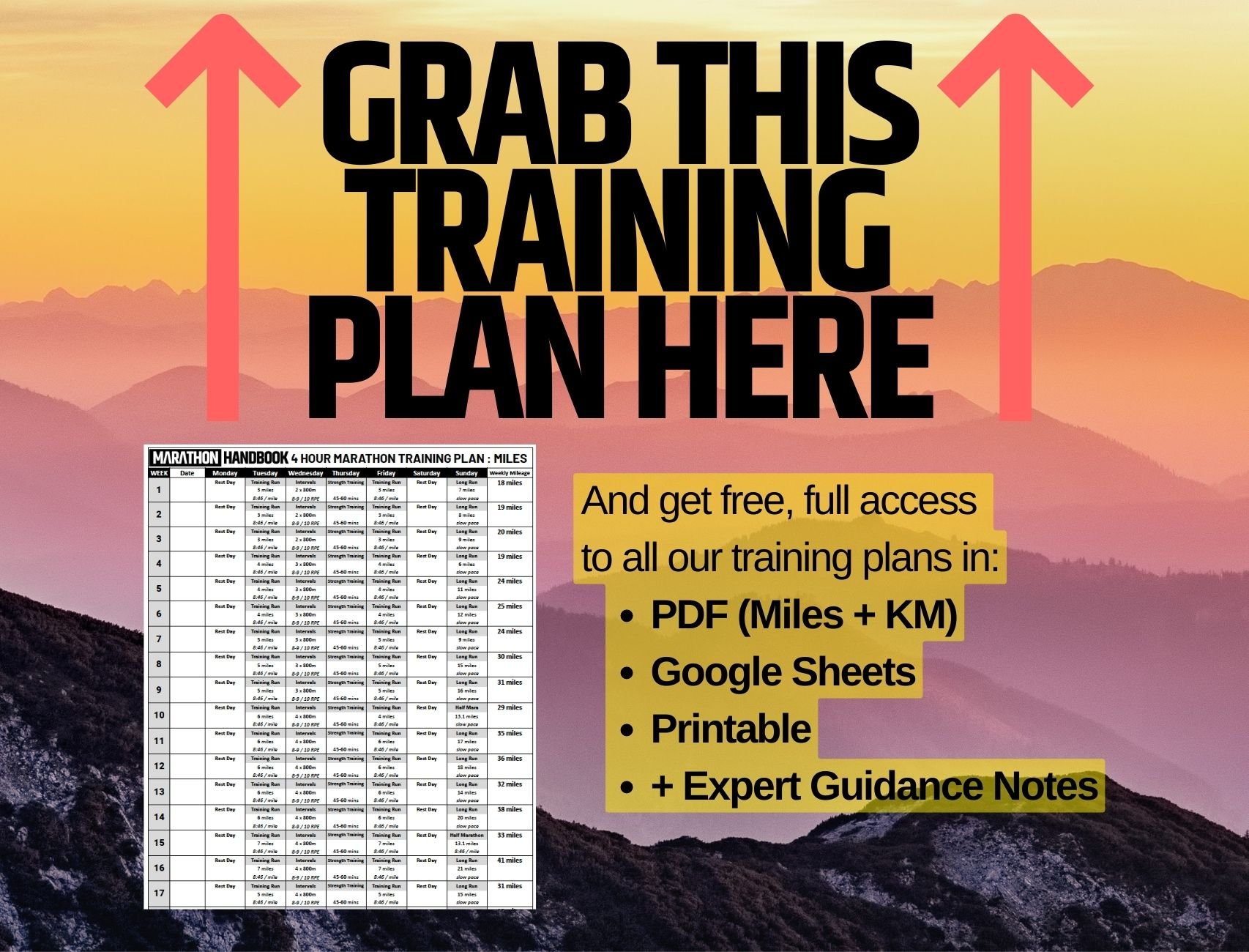
Our 12 Week Half Marathon Training Plan is our most popular training plan for the half marathon event!
This 12-week half marathon training plan with PDF included is designed to get you to the finish line comfortably while building your training in a structured way to minimize the risk of injury or burnout.
12 weeks give ample time for beginner and intermediate runners to get ready for their half marathon. Therefore, we’ve built this training program with a focus on building your endurance first, without too much concern about speed.
If you have more time to prepare, check out our 16-week half-marathon training plan designed with beginners in mind. We’ve also got a host of training plans structured around time-based goals (like running a sub-2-hour half marathon).
Ready to start your training?
Let’s jump in!
Absolutely.
As long as you have some running ability, it’s entirely possible to get ready to cover 13.1 miles in 12 weeks.
12 weeks is about right for most people; it’s enough time to allow you to gradually increase your mileage without overdoing it.
It’s also not too long a training period that you get fatigued or overtrain – it’s right in the sweet spot.
Our 12-week half marathon training schedule also includes a 2-week half marathon taper: in other words, you do your longest training run 2 weeks before your actual event, then wind down your training somewhat over those final two weeks, so you’re rested and ready when you line up at the start line!

This plan is for beginners and intermediate runners preparing for their first half marathon.
You should ideally be able to run 3 miles (or 5km) without stopping before committing to the plan.
(If this seems like a lot, you can adopt a run/walk approach in your training and race.)
If you’re looking for a great plan to get you through your first half marathon, then this is it!
12 weeks // 3 months.
The plan includes 4 runs a week, consisting of three different types of running.

The schedule will consist of 4 runs per week, 1 day of cross training, and two days of rest.
The plan is designed to cover the required mileage and hours on your feet to get you ready for your half marathon!
All of the regular runs should be done at a comfortable, sustainable, conversational pace; don’t worry about your pace or finishing time if this is your first half-marathon effort.
For the Wednesday Tempo Run, you can choose whether you want to increase the pace a little and target a specific race pace, or simply hang back and stick to your comfortable conversational pace.
Long runs on Sundays are there to increase your maximum mileage and time on your feet. The whole purpose of these is to run slowly – at a conversational pace – no faster.
If you are struggling during these long runs, feel free to take walking breaks, no worries. The important thing is to cover the mileage necessary.
The plan includes one day of cross-training and two rest days. The rest days are especially important for letting your body recover.
Feel free to download the plan and change it up to suit your schedule!


Enter your email, and I’ll send you this free training plan now, in PDF and Google Sheets formats (completely customizable), in both miles and kilometers.
After entering your email, you’ll be prompted to create an account on the Grow platform we use to control access to the plans. It’s completely free – make sure to complete the process to gain access to the plan!
Previous visitor or not seeing where to sign up?

We’ve teamed with TrainingPeaks to offer a premium version of the 12 Week Half Marathon Training Plan:
Access the plan via the TrainingPeaks website and app, track your workouts in real-time against the plan, and get performance data analysis on your progress.



Sure, everyone likes to humblebrag about their HM finishing times, or their comfortable running speed.
But when it comes to attempting a half marathon – especially if it’s your first – it’s wise to forget all about speed, at least as much as possible.
Trying to improve your running speed takes a lot of work, and specific workouts like Interval Training and HIIT-style sprint sessions. These can be a lot of fun, but also take their toll on your body.
When you combine them in with the long runs and increasing mileage of our 12 week half marathon training plan, you’re placing a lot of stress on your body. You’re not only trying to build endurance, but speed at the same time. And you’re massively increasing the risk of suffering from an injury, or burn-out, or exhaustion.
So my main advice for beginner half marathon runners is to choose a pace that you are comfortable and confident with. If that means it’s a relaxing jog, then so be it. It’s better to get to the finish line of your half marathon than burn out during training and not even start.
When you’re ready, you can check out our Half Marathon Pace Calculator to help plan your race speed based on your finish time goal.

Some people love their weekly long run.
Others get restless and uncomfortable when trying to keep running for so long.
Whether you love it or hate it, you should prioritise your weekly long run.
In fact, it’s the most important run of your entire week.
The long run is the workout which really builds your endurance. It teaches your muscles to keep going for longer and longer, it trains your cardiovascular system to keep delivering oxygen efficiently to your muscles, and tells your body that it needs to get good at fuelling for longer periods.
For the 12 week half marathon training plan, remember that it’s not necessary to run your entire long run. Feel free to take walking breaks, or even adopt a structured run/walk approach to your training.
But if you need a break from your training and want to skip a workout, try not to skip the long run.
Downtime is essential for runners.
Putting aside time to focus on rest and recuperation allows your body to relax, heal, and re-build – so it will be ready and stronger for the next workout.
The 12 week half marathon training plan includes 2 rest days a week, but remember that the plan should be flexible and based around your life; not the other way around.
So if you get to Friday and are totally burned out by a heavy week – whether in training, work life, or at home – never feel bad about granting yourself an additional rest day.
Perhaps the most important thing to do when training for a half marathon is to listen to what your body is telling you – if you find that training is getting harder and takes more and more effort, it’s probably a sign you need a break.

The 12 week half marathon schedule includes one day of cross training per week. While cross training can include any activity which complements your run training, I highly recommend doing a simple strength training workout.
Strength training, especially when focussed on the upper legs, core, and back, can have a huge impact on your running abilities.
Not only does it make you less injury-prone (those exercises tend to address muscular imbalances), it also makes you a more economical runner. In other words, you get more miles per gallon out of your legs, so you’ll find you can go a little faster.